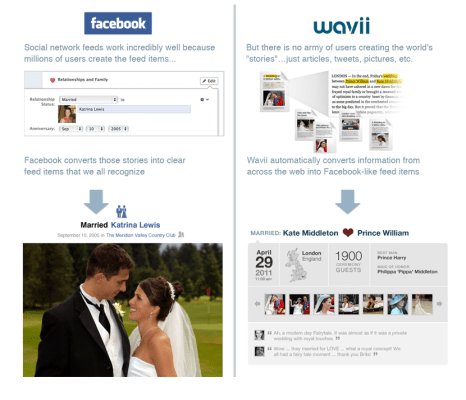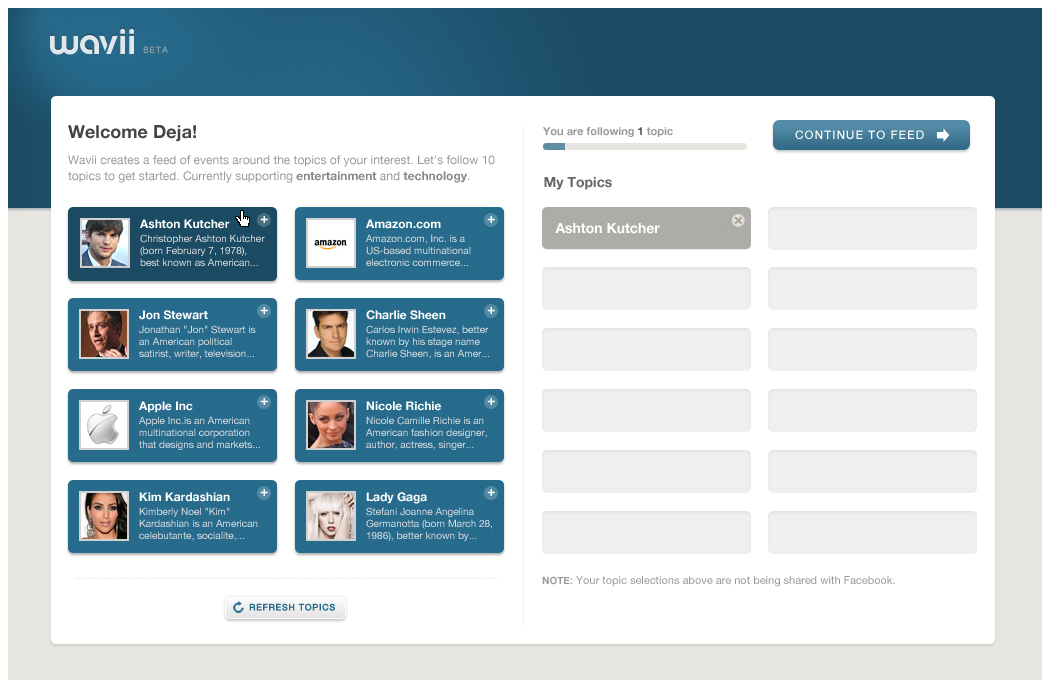The problem of how to find relevant content on the web has yet to be solved on a mass scale. You’ve got cyborg news aggregators like Techmeme and Google news and social aggregators like Reddit and Digg competing with Twitter and the Facebook Newsfeed, all of them trying to get you the news that you want to know, as fast as possible.
The Seattle-based Wavii, which has been in super stealth mode until now, takes a different approach to the problem. The startup uses natural language processing and machine learning to parse far corners of the web and bring users personalized content based on their Facebook Likes and feedback. Upon entering Wavii via Facebook Connect, you are asked to pick a combination of 12 topics that pertain to you and rinse, repeat. Wavii picks these initial interests by processing your Facebook Likes, and adjusts itself as you give it more data.
Your decisions in this onboarding process generate a preliminary “interest graph” from which Wavii draws your content timeline. Like on Quora, you can follow individual topics and people at any time — the Wavii algorithm eventually learns what you like and drills down, offering pared down summaries, visualizations, related data, images and videos tailored to your tastes.
Wavii presently only covers the Tech to Entertainment verticals (arguably the most popular topics online) but founder and former Microsoftie Adrian Aoun wants to expand it eventually to cover Politics, Sports, Music, Cities and Gaming.
Using NLP to aggregate and simplify content around its verticals and topics, Wavii attempts to eliminate bias and unnecessary information — boiling down web articles to just the facts. “We care about what happened,” says Aoun, “We don’t care whether the SAP acquisition of SuccessFactors was the most boring acquisition ever, we just care that SAP acquired SuccessFactors [note: Wavii designates different forms of content with tags like “Acquisition””Break”] We teach our system very much the same way humans read language.”
Aoun explains that one of the difficulties of aggregating content via NLP has been the de-duping of sentences like “Ashton and Demi break up” versus “Ashton dumps Demi.” A computer will have issues with words like “break” and “dump” in this context because those words can mean many different things other than “stop dating.” The Wavii machine focuses on clustering these articles together, no matter how they’re written.
Aoun views Wavii’s goal as making Facebook out of Google, “Facebook’s feed has proven itself as the best way of connecting with and staying on top of your friends, but it’s limited to friends. Users want the rest of their info that way too, whether it’s their interest in politicians, movies, cities, or startups. Wavii lets you follow everything else (e.g., politicians, celebrities, companies, products, etc). Instead of your friends’ check-ins, photo tagging, relationship status, etc., you get company acquisitions, movie trailers, celebrity sightings, etc. ”
Wavii crawls over a million online sources, from RSS feeds to links from tweets in order to generate personalized content for users. Aoun wants each post on a Wavii feed to function as conversation starter about what is happening in the world.
To further enable this, the startup has a conversation function onsite, with the additional ability to post a Wavii thread on Facebook. You can tag other Wavii or Facebook users by mentioning them using an @ symbol — the service will figure out which is which and proceed. Aoun tells me that he is also planning to have Twitter integration in the next month.
Wavii is seed funded by SV Angel, Felicis Ventures, Max Levchin, Mitch Kapor , Fritz Lanman, Max Ventilla, Shawn Fanning, Ron Conway, Rick Marini, Dave Morin and Crunchfund. Rumor has it that the 20 person team – with engineers from Amazon Web Services, Powerset and Last.fm — was fielding acquisition offers from biggies like Yahoo before it was even finished baking (Interestingly enough, Prismatic is a still-in-stealth Wavii competitor with an emphasis on Twitter versus Facebook).
Aoun hopes to fully launch Wavii within the next month or so. Five hundred interested TechCrunch readers can pick up an early invite to here.


![feed_crop[2]](https://techcrunch.com/wp-content/uploads/2012/01/feed_crop2.jpg)
